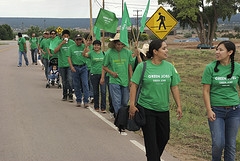“Oh these nights. My blessed bounty of dreams.” — Luci Tapahonso, Blue Horses Rush In
The bounty of green job dreams is one step toward becoming a reality on the Dinetah-Navajo Nation. Thanks to the indefatigable work of the Navajo Green Economy Coalition and Navajo Nation Speaker Lawrence T. Morgan, among many others, the Navajo Nation Council voted to create the Navajo Green Economy Commission on July 21st.
The legislation is historic: Reportedly the first green jobs bill among the First Nations, the Navajo Nation Green Economy Commission will create the infrastructure to qualify for federal money already earmarked for green job development, and focus on small-scale, community developments for a more sustainable and green economy.
The vote on Tuesday took place after a remarkable 14 month green march by green jobs advocates, after the original bill was tabled last spring. According to the Navajo Green Jobs Coalition, supporters from across the reservation gathered in front of the Navajo Nation Education Building and peacefully marched a quarter of a mile in green “Green Jobs” shirts to the Navajo Nation Council Chambers in Window Rock, AZ. Supporters greeted Council Delegates while filling up the front row seats of the council chambers. Multi-generational supporters sat in to encourage and ensure that their community representatives pass the legislation.
 Navajo Nation green marchWith a reservation unemployment rate at 44 percent, and the median family income at $11,885, the green jobs initiative couldn’t have come at a more timely moment.
Navajo Nation green marchWith a reservation unemployment rate at 44 percent, and the median family income at $11,885, the green jobs initiative couldn’t have come at a more timely moment.
“This is the just the beginning for Indian Country. We hope our efforts pave the way for other tribal nations to bring local sustainable green jobs to their communities,” said Wahleah Johns, Co-Director of the Black Mesa Water Coalition.
“A green economy is not a new concept to Navajo. There are many green business opportunities that fit perfectly with our culture. We must once again hearken to such processes to truly build our own economy that puts high value on our tradition — old and modern economic pursuits. In this way, we will build a vibrant economy for the future generations while honoring our great ancestors. Today’s decision is a critical first step towards making this dream a reality,” said Tony Skrelunas, the former Executive Director of the Navajo Nation’s Division of Economic Development and a member of the Coalition.
“The passing of this legislation is monumental because it is a catalyst for economic development on the Navajo Nation with Navajo traditional values and community at its core,” says David Johns, Vice President of the Dine’ Haatali Association (Navajo Medicine Men Association).
Along with a community assessment survey, the Commission would develop Green Job training teams to foster workplace development, green contractors and public service projects. Committed to zero or minimum pollution and C02 emissions, the Commission would focus on sustainable green manufacturing, such as wool mills, local and self-sufficient business ventures, such as weavers’ co-ops and green construction firms, and traditional agriculture projects, such as farmers markets and community gardens.
At the top of the list, energy efficiency projects, including the weatherization of homes, and sustainable water projects, could provide numerous employment opportunities.
Renewable energy projects would also be pursued.
For more information, see Marty Durlin’s blog at High Country News, and visit Navajo Green Jobs.


